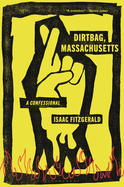
"My parents were married when they had me, just to different people" sets the tone for Isaac Fitzgerald's gritty and humorous memoir about his escape from the town that gives his book its name, Dirtbag, Massachusetts: A Confessional, and his hardscrabble search for his place in the world.
In 10 essays, the author consistently exposes the realities of his childhood while coming to terms with who he is and why he is. Fitzgerald's opinion of the world was fomented early on by his parents' love of literature, their Catholic faith and an apathetic view of worldly possessions. Whenever they had to move, their book collection took priority over furniture. Attending multiple weekly church services was mandatory, but so was reading to little Isaac from The Hobbit and "The Rime of the Ancient Mariner."
Fitzgerald refers to himself as "a child of passion!... a mistake in human form, a bomb aimed perfectly to blow up both my parents' lives," because his parents had separate marriages, each of which had already yielded a child, before their coming together. Ironically, they met in divinity school, "a pretty funny way to start an affair." As a consequence, they abruptly found themselves with no home and zero support from either set of parents. Bouncing around South Boston, from a teacher's cramped apartment to a homeless shelter and eventually to low-income housing, sounds like a nightmare for a child, but Fitzgerald remembers these residences fondly: "I was poor but cared for... my parents were good to each other and me, nobody told me I was supposed to be miserable."
"Everything went to shit when I turned eight years old," he writes. Getting mugged at gunpoint rocked his world, and his parents decided city life was no longer a good thing for their family. His father remained in Boston for work, but Fitzgerald and his mother relocated to a small rural town in North Central Massachusetts, to a drab house next door to his disapproving grandmother. The move was a cold slap in the face: "We brought our poverty with us. We went from city poor to country poor."
Rumors of his father's infidelities back in Boston and witnessing his mother's botched attempts at suicide led eighth-grader Isaac to smash a fellow student's nose with a math book. School suspension followed the incident, but instead of seeing a typical delinquent, Fitzgerald's teachers saw an intelligent student with a troubled home life. They banded together to push him toward boarding school, with a full scholarship. It's a pivotal moment in Fitzgerald's world, heretofore fraught with solo drinking, drug experimentation, teenage sex and a bout of bare-knuckle fighting inspired by the movie Fight Club. Boarding school offered an immediate deterrent from a clichéd pathway to incarceration or early death. Trading his poverty-stricken, small-town school life for a more academic, regimented system offered new and exciting opportunities. Some of the shiny educational possibilities included drugs like Adderall, Ritalin, Glade (yes, the popular air freshener), but Fitzgerald thrived in boarding school. The constant family drama became an out of sight, out of mind situation. His peers were posh. The drugs were free and generously shared, but more importantly, Fitzgerald's mind was finally allowed to bloom. Intellectual challenges were plentiful. Wealthy students embraced him and broadened his world perspective with music. His meager existence became a life of possibilities.
There's plenty of resonant moments throughout this memoir, but in one of the more chilling passages, naïve, 12-year-old altar boy Isaac is confessing his sins to his Catholic priest and trying to make sense of an incident with an older girl: "My confessions crash against him and then wash away. Until I mentioned Ashley. Here the looming silhouette straightened. 'Go on,' the priest said." Not long after that exchange, the Boston Globe published an exposé about the very priests Fitzgerald interacted with regularly. Only after the story of priests molesting young boys made headline news did it dawn on him how close he had come to being a victim himself. Fitzgerald's proximity to what had happened changed his thinking on religion and led him to wonder how much his staunchly religious parents knew about what was going on at their church. Escaping his toxic environment and coming to terms with his childhood became mandatory for survival.
Transitioning from a Boston altar boy to bartending in San Francisco, distributing supplies to the poor along the Thai-Burmese border, an acting stint in porn movies, writing children's books and climbing Mount Kilimanjaro isn't the typical path to self-discovery, but it has been Fitzgerald's. But perhaps recounting his path to healing can encourage others to find their own trail.
When Fitzgerald generously assigns blame to certain people for what happened along his arduous route to adulthood, he doesn't make the accusations with malice. He's merely stating the facts and recounting how he felt at the moment. There are no annoyingly timeworn parables thrown in readers' faces, either; the author is sharing his story in a genuine attempt to help others with their own journey. The result is equally a balm for the soul and solace for a troubled mind. --Paul Dinh-McCrillis

